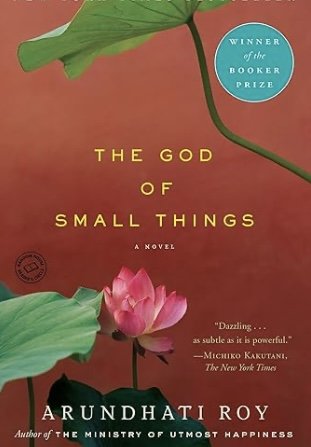The God of Small Things by Arundhati Roy (Random House ) ~ Janet Brown
In a large house by a river, an extended family that has been warped by cruelty live together. The patriarch of the household is dead but his behavior has sent his relatives in random directions, searching for what they never had. His wife, who bore the brunt of his rages and bears scars from the beatings he gave, has never recovered from the loss he dealt when he smashed her beloved violin into splinters. His sister fell in love with a Catholic priest when she was young, an unrequited passion that she still nurtures as an aging spinster. His beautiful daughter, Ammu, fled from her father’s brutality into a hopeless marriage that sent her back into the family home with two young children, a boy and a girl, fraternal twins. His son, Chacko, married an English girl when he was receiving a British education, a union that disintegrated after they had a daughter. All of them have in some way, transgressed against India’s Love Laws, “the laws that laid down who should be loved and how. And how much.”
The story begins with hints of a tragedy, the funeral of Sophie Mol, the child of Chacko and his English wife. Slowly and inexorably the threads tighten, weaving back and forth through time, setting the scene for death and separation in a way that is unstoppable and inevitable.
Estha and Rahel, the twins, are linked from birth, not by appearance but by mind and spirit. Each can taste what is in the other’s mouth. They feel each other’s pain and know each other’s memories, until the death of their young cousin severs them from each other. When Estha returns as an adult, he has stopped speaking. When Rahel returns, she is desperate to find the connection that once made them a single entity that lived within two bodies.
More than anyone in their family, the twins still live with the death of Sophie Mol. What they don’t know is this was propelled by their mother, a woman who fell in love with Velutha, the one man who showed her children true kindness, a man who was born a Paravan, an Untouchable.
In India, in 1969, caste rules were a keynote of society. Even when The God of Small Things was published in 1997, a relative told Arundhati Roy that the sexual relationship between the Christian Ammu and the Paravan Velutha was a “physical impossibility” since the two of them belonged to different species. Roy and her novel were taken to court with charges of “obscenity and corrupting public morality.”
Meanwhile Roy’s uncle gleefully introduced himself by saying, “Hello. I’m Chacko,” and her mother, when asked if she had experienced the affair that Ammu had embarked upon, countered with “Don’t you think I’m sexy enough?” Roy’s brother, amused, told his sister, “All of them want to be the people in the book…You’ve turned all the monsters into nice people.”
However none of this background information is why Roy won the Booker Prize with her first novel nor is it why it’s still in print and sought after almost thirty years after it was published. Her descriptions are richly lush, her characters are ones we all have known, in different countries and under different guises. Their tragedies are ones that in some degree have touched every living human, who in these pages find their own histories clothed in unforgettable words, in a story that lives on “like jet-streaks in a church-blue sky.”
